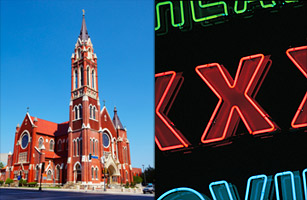
Aside from the occasional wardrobe malfunction and GoDaddy.com’s annual censor-baiting commercials, most people don’t associate the Super Bowl with sex. But this year, religious anti-pornography and anti-trafficking activists are using the nation’s biggest sporting event to take on the sex industry.
Because the hoopla surrounding the Super Bowl has expanded beyond Game Day to an entire week of parties and other festivities, large numbers of pimps and their workers flood into the host city each year. In Miami last year, police estimated that as many as 10,000 prostitutes from outside the area arrived for Super Bowl week.
The numbers alone have provided a challenge for law enforcement. But only in the past few years has it become clear that child prostitution is a feature of Super Bowl revelry as well. Two men were arrested last year for an ad on Craigslist’s Miami board advertising sex with a 14-year-old girl as a “Super Bowl Special.” And in 2009, Florida’s Department of Children and Families reported 24 children — most of whom were runaways — as victims of sex trafficking for the Super Bowl.
For the Super Bowl in Dallas this year, religious nonprofits in Texas began preparing early to counter the visiting sex trade. Groups like Traffick911 and Free the Captives worked with state attorney general Greg Abbott to make sure that Texas would crack down. “The Super Bowl is one of the biggest human-trafficking events in the United States,” Abbott said at a trafficking-prevention meeting in January. The attorney general beefed up a unit that is assigned to investigate and arrest those who trade in child prostitutes.
Christian anti-trafficking groups are part of a larger effort that includes the training of airline employees to spot and report child trafficking. Police in Arlington, Texas, set up an electronic billboard near Cowboys Stadium featuring mug shots with the warning: “Dear John, You Never Know! This could be you.” And Traffick911, which provides shelter for victims of sex trafficking, recruited high-profile supporters to record anti-child-prostitution PSAs. “If you’re one of these men buying these young girls, I’m telling you that real men don’t buy children,” says Dallas Cowboys nose tackle Jay Ratliff in one television ad. “They don’t buy sex.”
Using NFL players and Super Bowl hype to raise awareness is a tactic also being employed this year by XXXChurch, an anti-pornography ministry founded by Las Vegas pastor Craig Gross. He declared Feb. 6 “National Porn Sunday” and enlisted the help of big names in professional football to make saying no to porn a popular stance. Players like Seattle Seahawks quarterback Matt Hasselbeck — who led his team to the Super Bowl five years ago — helped film a 40-min. video that more than 300 churches across the country will play during their services on Feb. 6.
As for Gross, he spent the morning of Feb. 6 at a church in the Dallas suburbs to make a pre–Super Bowl plea with adult film star Ron Jeremy, who supports Gross’s message about porn addiction. It may seem like an odd pairing, but as Jeremy recently told CNN, “It’s exactly what Jesus would do if you think about it. He went right to where they were drinking and gambling and said, ‘Folks, this is no good.’ ”
See the top 10 gratuitously provocative acts.
See the most unforgettable images of 2010.